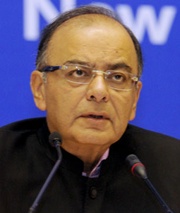GST, banking reforms and infrastructure will drive growth: Jaitley
07 Sep 2016
 The passage of a new goods and services tax and streamlining of the banking sector together with revival of stalled infrastructure projects will drive India' economic growth, finance minister Arun Jaitley said today, adding that banking sector reforms does not mean selling off state-owned banks.
The passage of a new goods and services tax and streamlining of the banking sector together with revival of stalled infrastructure projects will drive India' economic growth, finance minister Arun Jaitley said today, adding that banking sector reforms does not mean selling off state-owned banks.
In fact, the finance minister said, the government has no plans to relax ownership in banks as it would be contrary to state interest.
Public sector banks control 70 per cent of assets in the financial system and hold the lion`s share of India`s Rs800,000 crore ($120 billion) in bad loans.
"I don`t think that public or political opinion has converged to the point where we can think of privatisation in the banking sector," Jaitley told The Economist India conference on the Income Declaration Scheme in New Delhi.
Jaitley said his top priority is the passage of a new goods and services tax (GST) this autumn. He said he was determined to stick to a "very stiff" schedule that foresees passing critical enabling legislation for a new goods and services tax (GST) this autumn.
He said the government will press ahead with repairing the banking system and getting stalled infrastructure projects moving to drive growth, but it is not yet ready to sell off state banks.
The government is consolidating some of the public sector banks to strengthen their finances and management, as most of these banks are laden with bad loans and their lending capacity has been constrained.
The government currently holds 60 to 86 per cent in nearly two dozen state-run banks, but, Jaitley said, it has plan to reduce the state`s share below a threshold of 52 per cent.
However, the banks need money to recapitalise themselves and this has to come mostly from the market and the best way to tap market is to sell equity.
On the new GST legislation, Jaitley said once implemented, it would even out the layered tax structure and will have a "transformational" impact by creating a common market in India.
Since the new tax regime will be revenue neutral, it will, at the same time, act as a transfer mechanism that would aid poorer states in the federal structure.
Without stating the proposed rate under the GST regime, Jaitley said, the goal of the federal and state governments would be for the tax to be revenue-neutral and, and as the tax becomes established, for its rate to come down over time.
In fact, he said, the rate should come down over a period as the spread of the tax net widens.



















